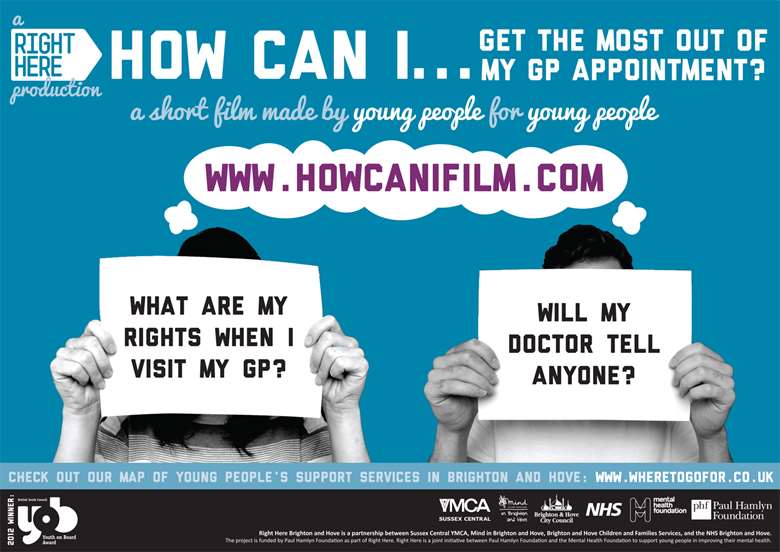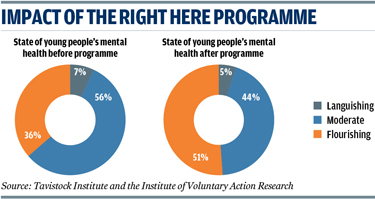How young people shape mental health services
Jo Stephenson
Monday, May 13, 2013
Scheme to improve provision of mental health services for young people shows high levels of satisfaction among participants

Project
Right Here
Purpose
To develop new and effective ways to support young people's mental health
Funding
£6m over five years. The Paul Hamlyn Foundation manages the scheme jointly with the Mental Health Foundation
Background
Mental health services often fail to provide appropriate support for vulnerable 16- to 25-year-olds. The Mental Health Foundation and Paul Hamlyn Foundation joined forces to launch a project to look at ways to improve provision. "What we wanted to do was look at how early intervention mental health services would be if young people themselves designed them," says Right Here communications and involvement manager Elise Leclerc.
Action
Right Here, which started in 2009, saw the establishment of four pilot schemes in Brighton & Hove, Fermanagh in Northern Ireland, Newham in London, and Sheffield, all funded up to the end of this year. A panel of young people helped design a framework for these schemes, which raise awareness of mental health issues as well as establishing new services. All had to feature a high level of youth involvement, ensuring young people had a key role in the designing, commissioning, delivery and monitoring of services. There was also an onus on projects to foster partnerships between youth services and mental health services "who often don't really speak to each other", explains Leclerc. Finally, the projects were designed to reach vulnerable young people less likely to be accessing more traditional mental health services.
Each took a different approach. The Brighton & Hove scheme, run by Sussex Central YMCA and Mind, targeted young people in sheltered accommodation, those not in education, employment or training and young people who are gay, lesbian, bisexual and transgender. Participants compiled a report on their experience of using GP services in relation to emotional and mental health, which was shared with local GPs and clinical commissioning groups. More recently, they set up a counselling fast-track service.
In Fermanagh, the group devised a programme for schools and youth groups to help young people feel comfortable about talking about feelings, and to give them the skills to develop resilience and build positive mental health. It also set up a young mothers' group to help participants "escape just being mothers" and rediscover other sources of happiness.
"That combination of youth involvement and partnership working has worked," says Leclerc. "The services young people have designed look very different to your traditional mental health services - they look a lot more like youth work. There is a lot of mental health early intervention that can take place in youth work settings, which is where young people actually go."
Implementing the projects was challenging, particularly in forging partnerships and involving adult mental health services. Overall, 2,000 young people have been involved in Right Here activities since it launched. As well as the local pilots, Right Here is running a UK-wide project with funding from Comic Relief and the Nominet Trust to develop online and digital resources to support young people's mental health needs.
Outcome
Right Here has been evaluated by the Tavistock Institute and the Institute of Voluntary Action Research. The final report is due in 2014. Data shows high levels of satisfaction among participants, with 95 per cent describing activities as "fun". Eighty-three per cent said they had felt comfortable talking about their mental health, while 76 per cent felt they had been able to support other group members.
According to data from 478 young people who took part in activities to raise awareness of mental health issues in 2011, 75 per cent believed they had increased knowledge of mental health and 72 per cent said taking part in the activities gave them a greater understanding of how mental health difficulties can affect people's lives, while 89 per cent said that taking part in Right Here activities had given them the opportunity to learn something new.
Average before and after scores using Mental Health Continuum Short Form measures show emotional wellbeing increased from 10.44 to 11.24, social wellbeing from 12.43 to 14.96 and psychological wellbeing from 19.67 to 21.62. The overall state of young people's mental health was categorised before and after taking part for one group of 229. Before, seven per cent were described as "languishing", while 56 per cent were "moderate" and 36 per cent were "flourishing". Afterwards, that shifted to five per cent "languishing", 44 per cent "moderate" and more than half - 51 per cent - "flourishing".

If you think your project is worthy of inclusion, email supporting data to ravi.chandiramani@markallengroup.com




